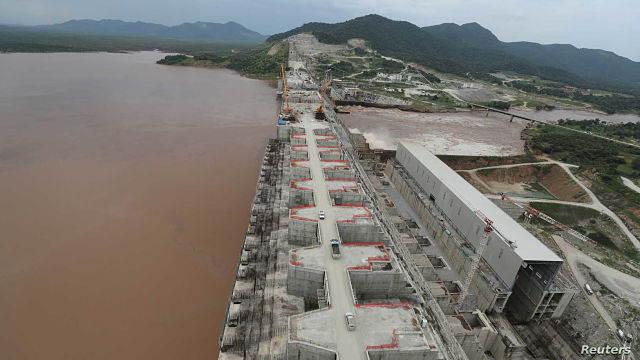 "America’s significant [financial] leverage over Ethiopia could provide U.S. President Trump with a chance to push for a treaty to prove his deal-making prowess...This proposal is likely to cause many years of delay in the filling period of the dam’s reservoir [small amount of water restricted to the Ethiopian winter months of July and August]. Moreover, this restriction could prevent Ethiopia from starting other projects along the Nile" (Reuters photo)
"America’s significant [financial] leverage over Ethiopia could provide U.S. President Trump with a chance to push for a treaty to prove his deal-making prowess...This proposal is likely to cause many years of delay in the filling period of the dam’s reservoir [small amount of water restricted to the Ethiopian winter months of July and August]. Moreover, this restriction could prevent Ethiopia from starting other projects along the Nile" (Reuters photo)
Brookings
By Addisu Lashitew

Why Ethiopia, Egypt, and Sudan should ditch a rushed, Washington-brokered Nile Treaty
The ambitious Grand Ethiopian Renaissance Dam (GERD) has been a point of contention among Ethiopia, Egypt, and Sudan in recent years. The GERD is now 70 percent complete, and its reservoir expected to start being filled in the rainy season of 2020. The three countries, however, have not yet reached an agreement on the process of filling and operating it in spite of years of negotiations.
These tensions are not new: The Nile has been a cause of antagonism between Ethiopia and Egypt for centuries. The Blue Nile, which flows from the Ethiopian highlands, contributes to more than half of the annual flow of the Nile (the remaining coming from the White Nile, which flows from Lake Victoria, and Atbara/Tekeze, which also flows from Ethiopia). The rich sedimentation that is carried by the seasonal flow of the Blue Nile has been the mainstay of Egyptian agriculture for millennia. Since the times of the pharaohs, therefore, Egyptians have been wary of an upstream dam that would strangle the flow of the Nile.
Modern Egypt has used legal, political, and military means to protect its access to the flow of the Nile, the only source of fresh water for its almost 100 million inhabitants. The fact that the former prime minister of Ethiopia, Meles Zenawi, launched the GERD—which will be the largest hydroelectric dam in Africa—in 2011, when Egypt was internally fractured by a revolution, also attests to the lack of trust between the two major riparian countries.
Egypt’s claims of a historical right to the waters of the Nile have been challenged by Ethiopia and other upstream countries that demand a more equitable utilization of the river. After extensive dialogue, 10 riparian countries formed the Nile Basin Initiative in 1999; however, this multilateral approach for developing the Nile has been stalled by Egypt’s insistence to maintain a veto power on future upstream projects, though it is a part of the initiative. It is in this context that Ethiopia unilaterally launched the GERD in 2011.
THE CURRENT STATUS OF THE NEGOTIATIONS AROUND GERD
As a hydro project, the GERD will not lead to additional water consumption in Ethiopia, but will reduce the flow of the Nile until its reservoir is filled. Thus, Ethiopia has been negotiating with the two downstream countries, Sudan and Egypt, on the pace of filling the reservoir. After failing to make progress for many years, the negotiations picked up momentum after Egypt’s President al-Sisi invited the U.S. to be a broker in November 2019. The foreign and water ministers of the three countries have held a series of meetings since December 2019 in Washington, D.C.— some of which were attended by the president of the World Bank, David Malpass, and the U.S. treasury secretary, Steven Mnuchin. The latest of these meetings came to an end without an agreement on February 13 and is expected to be followed by another round.
U.S. Secretary of State Michael Pompeo, who is visiting Ethiopia this week, is likely to make a final push to get Ethiopia to sign on to a proposed Nile Treaty. The U.S. is a major security and development ally of Ethiopia, dolling out more than a billion dollars’ worth of development assistance every year. America’s significant leverage over Ethiopia could provide U.S. President Trump with a chance to push for a treaty to prove his deal-making prowess once again. In the wake of his controversial peace plan for resolving the Israeli-Palestinian conflict, President Trump might be keen to strengthen his friendship with Egypt by resolving this thorny issue.
—
Related:
Ethiopia says US plans ‘substantial financial support’ (AP)
U.S. to offer financial support for Ethiopia political reforms -PM (Reuters)
Join the conversation on Twitter and Facebook.

























